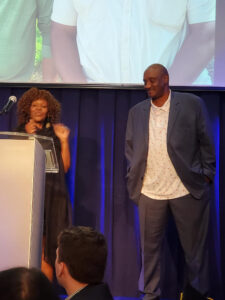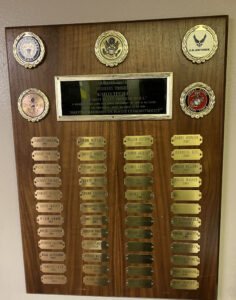Recovery & Basketball: Client Bounces Back from Addiction

Wayne Malone had the world at his fingertips. Born in Brooklyn, his family moved to his parents’ native Virgin Islands when he was 4. It was there that he developed a love for the game of basketball.
On the courts, Wayne excelled, immediately becoming a standout player. Opportunity brought him and his family to North Carolina where he played ball for the Laurinburg Institute, an historic African American prep school with a renowned basketball program and some of the sport’s greatest on the alumni roster including Basketball Hall of Famers Sam Jones and Charlie Scott.
After high school, Wayne suited up for St. Andrews University. While there, he tried out and made the Olympic team – for the Virgin Islands.

Wayne played in the Pan American Games of 1979 (Puerto Rico) and 1983 (Cuba). However, his dreams of making it to the 1980 Summer Olympics were dashed as the Virgin Islands joined the U.S. and other countries in a boycott of the games taking place in Moscow, Russia.
Assistant Coach Glenn Williams, a Laurinburg alumnus and a St. Johns University Athletics Hall of Famer, encouraged Wayne to transfer to his alma mater and play for the Red Storm. With one foot in the door, Wayne had to switch gears when Williams received an offer to coach overseas. That was when Wayne decided to join the U.S. Army. Traveling across Europe, he faced off against other countries – as a member of the International Military Sports Council (now known as the Military Basketball Association). Upon completing his military service, Wayne returned to his birthplace in Brooklyn.
Despite all the success he experienced across the world, Wayne had difficulty adapting to life as a civilian. He began selling drugs. Until then, he had only smoked marijuana. But as he began to deal, he decided to “sample his product.” After some time, he realized he was selling to feed his addiction.
As he puts it, “I was using and out of control. The lifestyle. That environment. The product turned on me.”

Wayne was arrested for possession and dealing. The Brooklyn Drug Court mandated him to treatment at the 43rd Street Veterans Program in Manhattan.
When he first arrived, Wayne admits he was not ready. “It’s a process. You don’t walk through the doors and submit to the process,” he explains. “I resisted. I did not want to be there. I still thought I could do things my way.”
For the next few months, Wayne yoyoed between the court system and 43rd Street, convinced he could deal with his addiction in his own way. Each time he went to court requesting a change to his sentence, he was sent back to the facility, where he continued to resist the rules and structure. During this back-and-forth cycle, he admits he had “lots of run-ins” with the Program Director Beverly Houston who consistently urged him to accept their system.
In retrospect, Wayne recognizes he was unwilling to adapt or commit to the program because he felt he was not given a choice. At a court date, the judge bluntly told him he did have a choice: treatment or prison. With that, Wayne’s decision was simple.
Back at 43rd Street, he started to think about his actions and his attitude toward the Veterans Programs. Wayne had an epiphany while talking with another client who was also a Peer. “Enough is enough!” he thought. From then on, he resolved to participate in the program, adapt to its structured schedule, and adopt the new changes to his life.

“I got grounded through Samaritan Daytop Village,” Wayne explains. “It was the first link in the chain that helped me progress through the process.”
As he moved from Phase II to Phase III of treatment, he could leave the facility to work at the VA Hospital’s Compensated Work Therapy (CWT) program. Through CWT, Wayne received vocational training and worked for Environmental Management Services (EMS). At the VA, he also participated in intensive clinical group sessions twice per week. He was not alone. Several fellow clients from 43rd Street, including the Peer who helped make his breakthrough, were also there.
To this day, Wayne gives equal credit to CWT for helping him turn the page during treatment. “Samaritan moved me forward toward CWT. That was the turning point,” he said.
Much has happened since he completed treatment in 2015. The VA offered Wayne a permanent job with EMS where he stayed until his retirement in 2022. He bought a home in New Jersey, and started an international shipping and receiving business with a storefront in Brooklyn.
Today Wayne remains in recovery from substance use disorder and “staying mentally strong.” The father of five enjoys spending time with his 10 grandchildren. He admits he has not played basketball in a long time but enjoys watching sports instead. The only games he says he plays these days are on a chess board. Wayne continues to enjoy traveling as well. He has crisscrossed the country and visited the Virgin Islands one more time.

Wayne continues to stay in touch with the staff at 43rd. He recently talked with clients as a guest speaker for the program’s Veterans Pride Group where the clients learned about his experience with addiction, treatment, and recovery. Beverly Houston said of Wayne, “He always stays true to giving back to the HERD.”
Last October, Wayne joined the ranks of Veteran Alumni Elite – former clients who have stayed in recovery for at least five years. His name is now etched on a plaque that hangs on the wall of 43rd with the names of every Veteran Alumni Elite since 2013.
*********************************
Discover how partnerships with other organizations help enhance services and the client experience at the Veterans Programs.
Learn about the groups and activities at 43rd Street that were funded by the New York City Council.
You can read more about the Black Tie event in this edition of the newsletter.